By Heidi Dahms Foster
One of the most important things we can do as pet owners is to educate ourselves about things that can harm the animals we love so much. Knowledge can save your pet from injury or worse. Here is a list of some of the items that can cause problems for your pet, but it is not exhaustive, and it helps to stay up to date.
FOOD
Xylitol (birch sugar) – the relatively new threat: Peanut butter is an old favorite of dogs, whether it’s straight out of the jar or cooked into dog treat recipes. But some of the newest peanut butters have a dirty little ingredient that can kill your dog.
Xylitol is a sugar substitute that is also found in breath mints, baked goods, cough syrup, children’s and adult chewable vitamins, mouthwash, toothpaste, some nut butters, over the counter medicines, dietary supplements and sugar free desserts, including “skinny” ice cream.
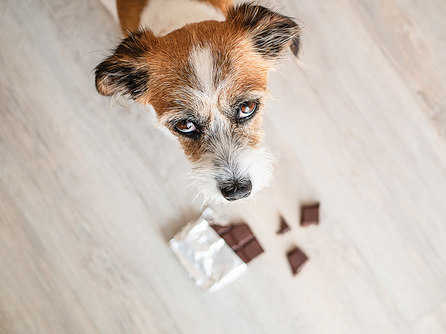
When dogs eat something containing xylitol, it is quickly absorbed into the bloodstream, and may result in a rapid release of insulin and decrease in blood sugar. This can occur within 10 to 60 minutes of eating the xylitol, and left untreated, can quickly become life-threatening.
If your dog ingests xylitol, it is important for you to bring the packaging for the product in question to the veterinarian’s office so that the amount of xylitol consumed can be estimated. It’s a good idea to check everything you feed your dog – don’t ever take ingredients for granted.
Garlic and Onion: Garlic is more potent than onion, and both are toxic to dogs. Cooked foods with garlic or onions are more concentrated. Can cause intestinal irritation and red blood cell damage.
Macadamia nuts: Avoid Macadamia nuts and foods that have macadamia nuts in them. Just a small amount can make a dog sick.
Chocolate: Chocolate is toxic because it contains a chemical called theobromine, as well as caffeine. Dogs cannot metabolize theobromine and caffeine as well as people can.
Cooked bones and fat trimmings : Cooked bones can easily splinter and cause your dog to choke, and cause cuts in intestines. Fat trimmed from meat, both cooked and uncooked, can cause pancreatitis in dogs.
Avocados: Avocados have a toxin called persin and can cause vomiting or diarrhea in dogs.
Coffee, Tea and Other Caffeine: Caffeine in drinks or food can be deadly to dogs.
Grapes and Raisins: Grapes and raisins can cause kidney failure in dogs.
Alcohol: Alcohol has the same effect on a dog’s liver and brain that it has on people. But it takes a lot less to hurt a dog, and the smaller the dog, the more dangerous it is.
Poison control resources: No matter how careful you are, your dog might find and swallow something they shouldn’t. Keep the number of your local vet, the closest emergency clinic, and the ASPCA Animal Poison Control Center – (888) 426-4435. If you think your dog has eaten something toxic, call for emergency help right away.
EQUIPMENT AND TOYS
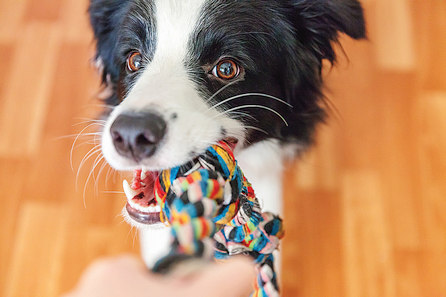
Flexi-leads: Those leads that allow your dog to venture far outside the traditional six-foot length of a dog leash are great if properly used. But they have become dangerous in the hands of people who do not use them properly.
Dog owners who allow their dogs to run to the end of the flexi lead and greet (or worse, act aggressively) toward other dogs can cause havoc and injury. Dogs can fight, become entangled, trip their owners, and worse.
If you use a flexi lead, respect other dogs and owners, and their space. Additionally, pay close attention, because if your dog takes off toward another dog or to chase a cat or rabbit, it can trip you up or cause a nasty rope burn.
Rope Tug Toys: Rope toys can fray, and threads get caught in your dog’s teeth, or worse, be ingested and result in serious internal injury. Discard your rope toys as soon as they begin to fray.
Rawhide chews and chips: Rawhide is a common chew, but it can be extremely dangerous for dogs. Rawhide is processed and full of chemical ingredients. It is a choking hazard, and after ingestion can block your dog’s intestines.
Pig ears also can cause intestinal upset or choking. Opt for safer chews and always supervise your dog while chewing.
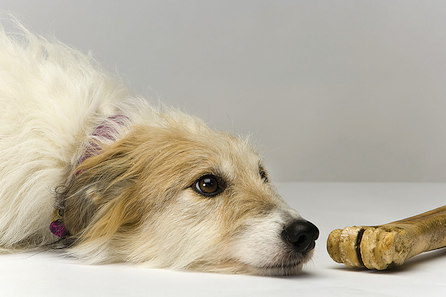
Dog toys and treats made outside the USA: These toys and chews can contain toxic substances that can harm your dog. Research healthy ingredients, and buy from reputable US companies.
Cow hooves: Be wary of cow hooves – they can cause tooth and jaw damage if you have an aggressive chewer.
Food bags: This includes any bag that your dog might be tempted to get into because it has or had food in it.
Many dogs have died from suffocation when they tried to eat chips or other foods (think chips, bread, cereal, dog treats and dog food) from a bag. While trying to reach the food, dogs will suck out all of the air and then cannot get the bag off of their head.
Make sure that you never leave food bags out, and when you are finished, tear the bag open before disposal.
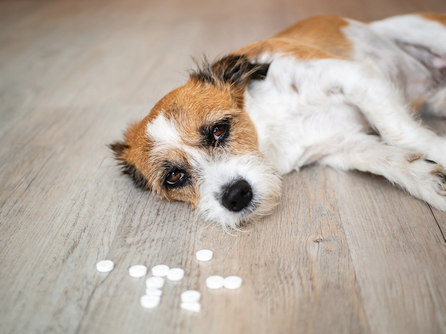
MEDICATIONS
Medications can be particularly dangerous to your pet.
Acetaminephen and aspirin: These should ONLY be used under a veterinarian’s treatment plan.
CBD: There are many beneficial CBD products that can help your dog with pain and anxiety. These products do not contain THC, the ingredient associated with marijuana’s high feeling or psychoactive effects. Products with THC can be extremely toxic to your pets.
Make sure that all medications are properly stored where your dog cannot get to them. Be careful not to drop medications or leave them out.
INSECTICIDES AND GARDEN PRODUCTS
Pets can suffer greatly from exposure to toxic insecticides, household and garden products. Some of the most hazardous products include:
Flea control chemicals: While flea control is a worry for most pet owners, even “natural” products can be harmful to your pet, and some breeds of dogs are sensitive to some flea control chemicals.
Do your research, talk with your vet, and try some alternatives that are safer for your pet, such as indoor plug in flea traps, and diatomaceous earth, which will kill fleas and other insects such as ants, roaches, other home invading insects.
Diatomaceous earth is also a great slug and snail killer. Be sure to follow directions, as the dust can be harmful if inhaled.
Lawn fertilizers and garden chemicals: Some lawn fertilizers contain herbicides, which can be toxic to dogs.
Dogs love to roll, run, and play in grass, or eat it, and that makes them more vulnerable to any chemicals. There are some organic fertilizers and weed killers available – if you have dogs, do your research. In your garden, watch out for non-organic slug and snail killers, fly baits, and regular garden insecticides.
Try using fly and mosquito traps, and natural pest and slug control.
De-icing salts and antifreeze: In the garage and around the house in winter, use non-toxic de-icing salts. Always avoid antifreeze – it is extremely dangerous to animals, even if they lick a small amount off the ground. Watch for coolant leaks in your parking areas.
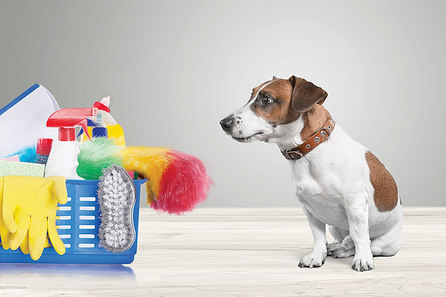
Household chemicals: Cleaning products can put your pets at risk. Always read directions and keep these products safely stored.
Use as little as possible, or use alternatives such as vinegar or non-toxic cleaners.
Be careful of mothballs – ingestion of just a few can be fatal to a dog or cat.
Rodent poison and mole/gopher killers: Rodent poisons contain warfarin, which causes internal bleeding. It will literally kill your pet, and even eating a rodent that has died from warfarin can harm your dog. Make sure to keep it securely away from your pet.
Mushrooms and toads: When we get a lot of rain, mushrooms can grow in your yard. Look out for them and uproot them, as they can be toxic if your dog ingests them.
Toads also come around more often when it’s damp, and dogs often cannot resist as they are living, jumping things! They can be toxic, and it’s best to keep your dog away from them.
AWAY FROM HOME
Travel: Watch any lost pet site and you can find people desperately searching for their beloved pets after a car accident, when the animal, terrified, ran away from the scene.
If you stop fast or have an accident, your loose dog can become a projectile, injuring themselves or you. Always use a secured dog crate, or at the least, a pet seat restraint.
Don’t let your dog ride in the front seat – an air bag deployment can kill them. If your dog rides with its head out the window, bugs, wind or other items can injure eyes.
Never let your dog ride in the bed of a pickup – one fast stop or worse, an accident, can send your pet flying to its death.
No matter how little time you expect to be gone, never leave your pet in the car on a warm day – the temperature rises quickly and if you are delayed, your dog can suffer a painful death. A cracked window is never enough!
Snakes and insects: In areas where venomous snakes are prevalent, it’s a good idea to get snake aversion training for your dog.
Even rattlesnake vaccine will only buy time. If you are out on a trail, you can lose your pet before you can reach help.
In Arizona, it’s not uncommon to have the occasional rattlesnake near your home.
Essential Oils: There are many essential oils that are safe and beneficial for dogs, but you must do your research. These are highly condensed oils and can cause serious problems if misused.
Cats are also highly susceptible to these oils so if you have cats, use extreme caution.
Dog Parks: Many people and their pets enjoy dog parks. However, take extra care when accessing your local dog park.
Dogs can carry sickness, so make sure your pet is fully vaccinated before going to the dog park.
If you have a small dog, let them play only in the area designated for small dogs. Even a friendly large dog can cause serious injury or even kill a smaller dog.
If you notice an aggressive dog at the dog park, no matter the size, don’t take a chance, remove your dog.
If you have a dog that doesn’t play well with others, realize that the dog park is not the place to exercise him.
This is by no means an exhaustive list of hazards. We don’t have to live in fear to keep our pets safe, but we must use common sense and take thought to protect them.
MORE INFORMATION
Most Dangerous Household Items for Dogs:
Household Hazards for Pets:

